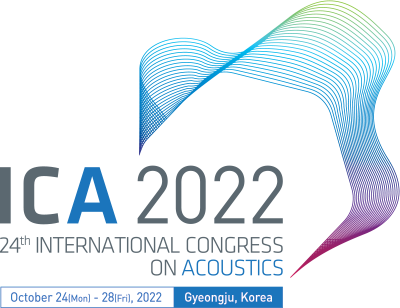International Congress on Acoustics 2022
Statement of Publication Ethics and
Publication Malpractice
International Congress on Acoustics (ICA) 2022 is committed to upholding the highest standards of publication ethics and takes all possible measures against any publication malpractices. Our publication ethics and publication malpractice statement is mainly based on COPE´s “Core practices”.
1. Duties of Editors
Publication decisions
The ICA 2022 Technical Program Committee is responsible for deciding which of the abstracts submitted to ICA 2022 will be accepted for presentation and for publication of the final paper in the ICA 2022 Conference Proceedings. The decision is based on the results of the abstracts review process, accomplished by the ICA Technical Program Committee. Main selection criteria are the contribution’s importance, originality and clarity, and the study’s validity and its relevance. The submitted abstracts are reviewed without regard to the authors' race, gender, sexual orientation, religious belief, ethnic origin, citizenship, or political philosophy.
2. Duties of Authors
Reporting standards
Authors of original research reports should present an accurate account of the work performed as well as an objective discussion of its significance. Underlying data should be represented accurately in the abstract and in the final manuscript. A paper should contain sufficient detail and references to permit others to replicate the work. Fraudulent or knowingly inaccurate statements constitute unethical behavior and are unacceptable.
Originality and Plagiarism
Authors will submit only entirely original works, and will appropriately cite or quote the work and/or words of others. Publications that have been influential in determining the nature of the reported work should also be cited. Another person’s original work, such as data, figures, text or ideas, should be properly acknowledged in the author’s manuscript and not be presented as if they were the author’s own.
Acknowledgement of sources
Proper acknowledgment of the work of others must always be given. Authors should cite publications that have been influential in determining the nature of the reported work.
All sources (especially pictures, photos and graphs) must only be used when the appropriate copyright is granted. Authors must make sure to exclude materials of which they are unsure about the copyright status and of which they know that copyright is not granted. In case of copyright infringement, the author is aware that he or she is liable.
Multiple, redundant or concurrent publication
An author should not in general publish manuscripts describing essentially the same research in more than one journal or primary publication. Submitting the same paper to more than one journal or Conference constitutes unethical publishing behavior and is unacceptable.
Authorship of the paper
Authorship should be limited to those who meet all of the following conditions: 1) substantial contributions to the conception or design of the work; or the acquisition, analysis, or interpretation of data for the work; 2) drafting the work or revising it critically for important intellectual content; 3) final approval of the version to be submitted; and 4) agreement to be accountable for all aspects of the work in ensuring that questions related to the accuracy or integrity of any part of the work are appropriately investigated and resolved.
The corresponding author ensures that all contributing co-authors and no uninvolved persons are included in the author list. The corresponding author will also verify that all co-authors have approved the final version of the paper and have agreed to its submission for publication.
Fundamental errors in published works
When an author discovers a significant error or inaccuracy in his/her own published work, it is the author’s obligation to promptly notify the editor or publisher and to cooperate with the editor to retract or correct the paper.
Publisher´s confirmation
In cases of alleged or proven scientific misconduct, fraudulent publication or plagiarism, the publisher, in close collaboration with the editors, will take all appropriate measures to clarify the situation and to amend the article in question. This includes the prompt publication of an erratum or, in the most severe cases, the complete retraction of the affected work.
Disclosure of Conflict of Interest
If there are conflicts of interest related to author’s commitment, financial support, personal relationships, or dispute over this work, then the authors must disclose the nature of the conflict in the manuscript.
References
Committee on Publication Ethics (COPE). (2022). Core practices. Retrieved from https://publicationethics.org/core-practices [7 February, 2022]
Seoul, 7 February, 2022
Acoustical Society of Korea

